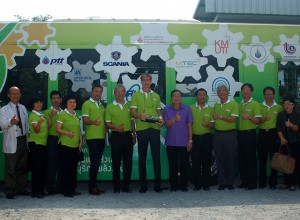The deadline for the submission of tenders to supply Bangkok Mass Transit Authority (BMTA) with a new fleet of 3,183 buses, was finally scheduled for January 2015. Conspicuously absent from the race to secure the orders worth about THB28.9 billion to deliver natural gas-fueled public transport vehicles were two major Swedish bus manufacturers, Scania and Volvo.

Lack of transparency in the drafting of the project’s terms of reference and multiple subsequent revisions by the BMTA did not bode well for the Scandinavian manufacturers of high-quality bus chassis and their bus assembly partners. The on-again, off-again procurement project had been dragged on for over eight years.
Politicians, who had supervisory control over the financially-ailing Bangkok city bus agency, did not seem to be able to agree on the simple task of drawing up a coherent and clear-cut TOR to ensure a fair bidding process. A process that would produce winners capable of delivering brand new city buses which are cost-effective to operate, meet high environmental standards and provide comfort to passengers.
Not to mention the fact that dubious changes made during the drafting and subsequent multiple revisions made to the TOR also gave rise to widely-publicized allegations that the whole procurement process has been rigged in favour of certain manufacturers.
Senior executives of both Scania and Volvo, in separate interviews with ScandAsia, stopped short of pointing an accusing finger at anyone. But both Scania Siam and Volvo Truck & Bus Co., Ltd. gave a number of compelling reasons why they have decided to opt out.
Mr. Phuriwat Rak-Intr, General Manager of Scania Siam Co., Ltd., said Scania Siam had been invited to a series of public hearings and present Scania bus products that met all the basic requirements, such as NGV-fueled powerhouses, low-floor bus chassis.
“We had full confidence in our products,” the Scania Siam executive said, adding that at that time the draft TOR was still more than a bit hazy.
Scania had held several meetings with the BMTA with the Swedish Embassy acting as a facilitator, following an official visit to Sweden by then-prime minister Yingluck Shinawatra in August 2013.
“When the TOR came out following a series of public hearings, we found ourselves facing insurmountable barriers. We could not go on,” Phuriwat said.
The TOR, among other things, requires bidders to have prior experience in Thailand, meaning having their products in use in this country on commercial basis, while at the same having prior experience providing repair and maintenance services on the said products, the Scania Siam general manager said.
“Scania never had NGV product in the Thai market before. But we have had our high quality city bus products, including those with NGV-fueled engines elsewhere, in Europe, for instance. Apparently that doesn’t qualify us to participate in this bidding process,” he said.
Phuriwat also said the median prices specified by the BMTA at THB4.5 million for air-conditioned, low-floor bus and THB3.8 million for regular, non-air-conditioned bus, are way too low for Scania Siam, which offers high quality bus products, to participate.
The Scania Siam executive lamented the fact that the BMTA clearly does not put enough emphasis on environmental standards or quality and reliability issues. The TOR does not specifically require quantifiable up-time and reliability, nor does it refer to high environmental standards as key criteria, he said.
“To appreciate the kind of value that Scania bus products have to offer, we challenge BMTA to look at total life cycle cost, which is the purchasing price plus fuel cost and maintenance cost over, say 10 or 15 years,” Phuriwat said. “The price of our finished city bus products that meet international emission standards, high fuel-efficiency, high up-time and durability would be in the tune of THB6.5 million.”
Scania city bus products, which meet the highest environmental standards, fuel-efficiency, reliability and durability, are popular among bus operators all over the world. In Asia, Singapore and Malaysia, city bus operators have purchase big fleets of Scania buses.
“Another thing we would like to tell the Thai public is: we have on offer cutting-edge technologies, including a diesel engine Scania bus running on ED95 (95% sugarcane or cassava ethanol plus an ignition improver). This could hugely benefit Thailand, which has great potential as producer of ethanol, which is a more environmentally friendly than diesel and more economical and sustainable than imported natural gas,” Phuriwat said, “If only Thailand had a more coherent national energy policy.”
Scania had been so hopeful of its fighting chance to supply the BMTA with its bus running on ED95 as alternative to natural gas that it sponsored a pilot projects in June and July 2011 and in mid-2013 to demonstrate the viability of its products in Bangkok together with King Mongkut’s University of Technology Thonburi, the Energy Ministry, Industry Ministry and PTT. But its hope was dashed when BMTA insisted in the TOR that initial purchase price of buses is to be the overriding factor.
A sales manager of Volvo Group’s Truck and Bus (Thailand) Co., Ltd., who is familiar with the BMTA bidding process, echoed Phuriwat’s sentiments, saying the specified low median prices were a major factor that prevented Volvo from competing.
“The TOR that the BMTA came up with made it impossible for high quality European manufacturers to participate. We simply cannot compete at those price points.”
Besides, the sales manager said Volvo had very few natural gas-fueled bus products as the company has concentrated its efforts in developing mainly diesel-fueled bus products that conform to the highest environmental credentials, from Euro 4, 5 and 6 emission standards and diesel/electric hybrid models or fully electric ones.
“Volvo Truck and Bus is not familiar with the bidding process that makes us feels like we have to compete with others to lower prices in order to get the contract. We would prefer submitting sealed bid and then to negotiate specifications with the buyer,” he said.
